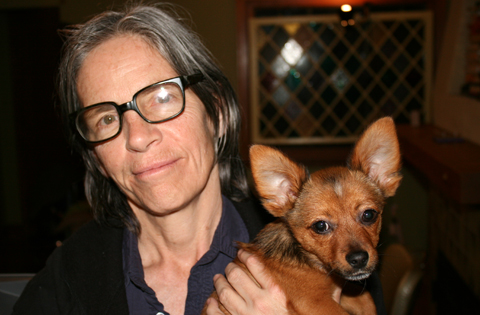
BEYOND THE CULT The cambridge-born Myles gave her first readings at CBGB's. |
"Gender is a technology," Eileen Myles says. She's at her home in New York, talking about her new double collection of poetry, Snowflake/different streets, a slim, gorgeous volume that's perfectly demonstrative of the post-queer philosophy that defines her work. Being queer, she says, "just means oddly shaped. In a certain way, it's like this person, this statement is askew from what we have been — what we're used to expecting. And I think that 'askew-ness' is truly universal. I think — especially in this moment where we're kind of moving through all this different media and bodies of information —I think there's a deep loneliness, [a] cultural loneliness in all of us."
Myles has always written queerly, her lens beautifully tilted, her work — whether art critique or a libretto or novels or, again and again, poems — lawless and conversational, precise and transcendent. In her new collection she illuminates the link between gender and physical space in one pass. "There's no female/in my position/There's no man," one of two pieces titled "Snowflake" announces. Then, as if to remind us of the benefits of being a "snowflake," unique and common, capable of a vision that sees beyond social constructs of sex and gender, it goes on: "wow/there's a raccoon/on the tail/of the plane/and there's/no one/seeing that now/but me."
Myles, a Cambridge-born poet who is the recipient of many institutional accolades — including a recently announced Guggenheim — has been called "a cult figure to a generation of post-punk female writer-performers" by the New York Times. It's hard to imagine a more apt description. She gave her first reading at CBGB's during the height of the NYC punk scene, studied with Ted Berrigan and Alice Notley, directed the St. Mark's Poetry Project, ran as a write-in candidate for president in 1992, toured with Sister Spit (twice!), contributes to Art Forum, The Believer, The Nation, and other publications, and has a devoted, fervent fan base that crosses generations.
Myles's work generally concerns identity: its negotiations, the possibility of connection between people, the challenge of boundaries (age, sex, sexuality, occupation, genre), and mostly the multiplicity of self. She's frustrated at how often she's labeled a "lesbian poet." She is a writer in motion, for whom "much of/the excitement/is getting really/close. to/describing the self," so she is at once alone and, perhaps, an unappointed representative of a particularly post-queer perspective: one that concerns itself with creating visibility for identities easily erased, bodies ignored, categories blurred.
"I think for me as a queer, the way I'm most interested in my queerness or my poet-ness being talked about is in terms of other genres and other practices," she says, "and how those boundaries aren't so firm." The geographical limitations of boundaries is perhaps a particularly appealing image to Myles because she is always traveling, and much of Snowflake/different streets is rooted in the binary of the coasts. She left New York to teach in California for a few years in the '00s, and the difference between the two birthed Snowflake.